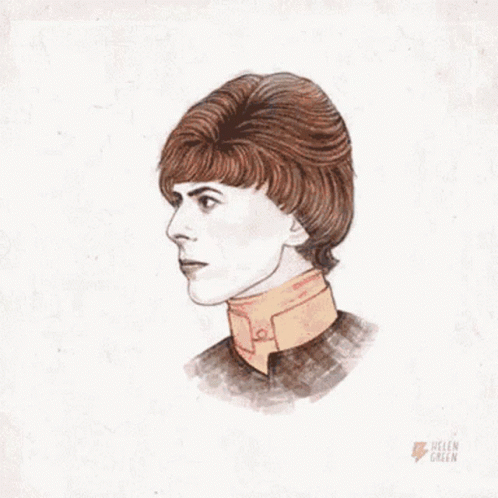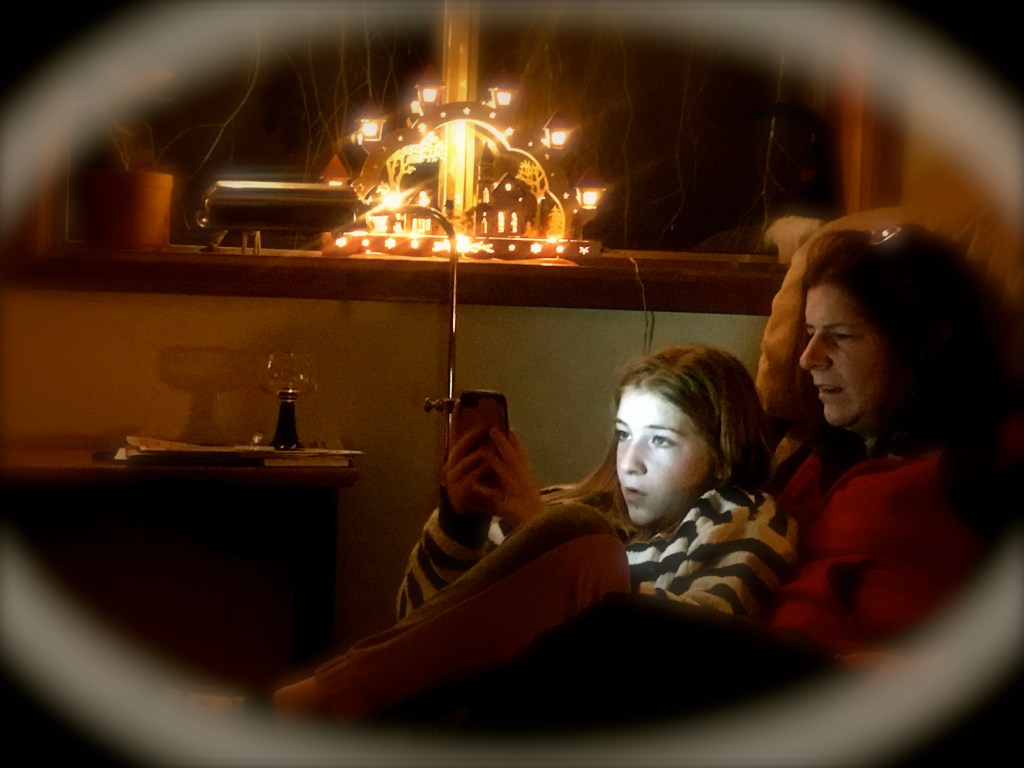In my dream I dreamt my avatar was swimming. The sensation was so real to me, like the me I watched on screen was the same one lying in bed dreaming. It has gotten that way when I game now, the virtual me and the real me overlap. And that leaves me wondering if I’m more aligned or askew. And if I should take a break from gaming.
On a philosophical level, it is both fascinating and distressing to think I could have multiple selves. It makes me feel expansive and empty at the same time. But shifting between roles is something we do so effortlessly as humans we don’t even think about it. It’s like changing scarves. And yet it makes me wonder, who’s behind the artifice? Is there a constant, “real me?” A wizard behind the machinery?
The term avatar, most commonly used now in gaming, originates hundreds of years ago in Indian culture. A similar term, persona, goes way back too. Each convey the idea of an alternate version of ourselves used as a proxy to represent the real us. Coexisting selves in different form factors, available for any setting. One is perhaps less of a realized ‘self’ than the other, but that depends on your point of view. In a gaming scenario, the ‘me’ another player encounters on screen is arguably more real to them than the ‘me’ that player will never see. And this is where the question of “what’s real?” gets really interesting.
Avatar comes from the Sanskrit avatāra, the ‘divine descent’ of a god to earth. Vishnu famously had 10 avatars who came to earth in various forms when things got so bad we needed an intervention. The avatar was an earthly manifestation of the god, so you can see how the term got co-opted as a skin gamers use to represent themselves virtually. We come down from the heavens to descend on screen. Kind of poetic, right?

Marketers took on the avatar term too, alongside persona, to focus their selling on an imagined demographic or ideal buyer. When I worked a contract for Zillow, the company actually gave their marketing personas names. “Alan” was the name used to represent all real estate agents. Personifying their target customer as Alan had the uncanny effect of elevating the role of their customers in meetings or on company communications. Basically it made them more real.
In researching the origin of the word persona I learned that personō from the ancient Greek means “to sound through,” and persona in Latin means mask. The persona was a key prop in Greek theater: actors used masks to denote their character or role in society so the audience could understand what kind of person they were.
The Greeks used the mask as a tool to make their audience feel a certain way about a character (villain, prostitute, court jester) and to follow along with the storyline. But the mask couldn’t always be trusted. And this is one of the universal truths about human nature that continues to this day. Even though it has taken on different forms, the persona is a tool we still use with our audiences. What’s most intriguing about it isn’t so much who we really are when we wear a mask, but who we could be.
The mask idea of persona relates back to the question of which self is more realized, based on the point of view. Similar to the gaming scenario where the online avatar is more of a “self” to other players than the real player behind the console, the same could be said for a character on stage, the actor behind the mask. While the actor subsumes their real selves to the character they’re playing, method actors rely on their own experience to pair the character’s situation with one they personally identify with. And in this way they make the performance more convincing, aka real.
In the most literal sense of the phrase, we are who we seem to be.
Emily Bernhard-Jackson, on David Bowie
Perhaps no entertainer has celebrated the persona more than David Bowie. (You can take the image of the Indian god Vishnu with his 10 earthly avatars and replace it with the many faces of Bowie.) In fact, Bowie was such a genius of the persona he was like a set of Russian stacking dolls. It was a grand celebration of human creativity and the elasticity of self, and Bowie made no bones about practicing his shape-shifting live, publicly. And for the self-admittedly weird, or for those who were made to feel that way by society, Bowie helped liberate untold people to explore, and to be more of their own selves. Bowie wasn’t even his real name.

But what does that even mean, to be more of your own self? In the case of Bowie, throughout his many personae there is still the thread of David Jones, of David Bowie. There is some static identity beneath the characters. Was Bowie helping us consider that elasticity of self, or instead showing us the self is a farce? That it’s all a performance? Fantasy?
To me, technology has made the fantasy world seem more real and the real seem more distant the more we lose ourselves in it. Social media has lifted the banal to the remarkable, reducing everything we experience as material for us to record and perform. That performative mindset projects us outwards but removes us from our physical worlds in the process. The mask we use to “sound through” becomes the primary identifier to an abstracted elsewhere. Most of us carry one in our pockets every where we go.

For our two teenaged daughters, I wonder how they grapple with the constant tension of fitting in and individuating in such an arena. With literally a world full of teenagers (and creepy men) in the audience. With our culture’s emphasis on the external self (particularly with women), as the internal so delicately forms. Our brains not designed to handle so much data, no wonder the psychic toll it’s taken on our youth.
Or could it be that our children understand the shape-shifting required of online personae better than we ever will?
Still I wonder if they have a strong enough foundation, a ‘real self,’ to come back to when they leave the stage of their cameras, as 14- or 15-year-olds. And with all the distractions and options for who they could be, is it too hard for kids to cement that real self?

If the phone is the new mask of Greek theater, a personō for us to sound through, perhaps our kids just understand better than we do how to really use it. Because as Bowie showed us, isn’t the self a kind of fiction? For Buddhists, the shedding of self a letting go of egoism, a form of enlightenment? What’s the point of it?
When I dream I’m flying it feels real because I imagine I’m flying. It’s the perception that makes it seem real. And could it be that it’s the perception of who we are that constitutes the “real me?” This is what politicians and pop stars know best. And if it’s true that we can influence that perception, we can be anyone we want to be.
…or, we can be made into whatever we’re told we are, what someone else wants us to be. That’s the second person. Perhaps the argument for the first.


Then there’s the whole writer’s persona. Stop me if I’ve mentioned this before (you can’t stop me!), but many years ago I had a regular reader come up to me and my wife once and say, “It must be such fun in your house!” No. No, it isn’t. There’s yelling. So much yelling.
This treatise was a treat.
LikeLiked by 1 person
Ross Murray! I’m so glad you popped by. I just got the place deep cleaned. Glad for your company and friendship. Kin even. Clan! Murray! Love and warm wishes to you and the brood, up thar…
LikeLike
Interesting piece. Can you see the real me? It’s hard to say whether I’m wearing a disguise or not. One of the overriding themes of the memoir I published is that I was deluding myself for years and when I suddenly realized who I am, I was shocked and disoriented. I feel like I’m pretty authentic now. Once in college, I had a dream about meeting a girl and really hitting it off with her. The next day the phone rang it it was the girl asking me to go to sleep so she could see me again. Oops, I was still dreaming.
LikeLiked by 2 people
Delusion is the big D for sure Jeff, right by the letter F. I can relate to that. But also the appeal of the fantasy world and suspension of disbelief, right? To a point. Thanks for reading and sharing your thoughts! I could just stare at that Bowie GIF all day long, literally.
LikeLiked by 1 person
Yes, I wasted a bit of time staring at that gif
LikeLiked by 1 person
Oh and you put that Who song in my head now and it won’t come out. Thanks for that, mean it! The kind of stain I would welcome.
LikeLiked by 1 person
I listened to a podcast on the who the other day, and I’ve got half their catalog on loop in my brain.
LikeLiked by 1 person
I love the fact Daltrey was basically fine as being just a singer and didn’t seem to have the kind of artistic aspirations as Townsend. And yeah, he has some amazing blue eyes and a damn good scream.
LikeLiked by 1 person
Well, exactly! I’d push it even further. People believe they are changing their personas by changing their appearances, their styles. But try to change something real, or what you think it real. Some real part of your identity, where you live, how you make your money, if you’re married, if you’re a parent, then we see how hard our true selves stick. Children are free from this to a degree, because they still exist in the possibility spectrum, they have enough space/time ahead of them to alter their trajectories, hopefully, in any case. I think as we get older it all calcifies, where even though in our minds we have some freedom in play, imagination, we start to become bit horrified at the prospect that any of the core stuff could actually change.
Some circles are pushing this idea of an avatar even further with simulation theory. What if we are literally existing in a Matrix type thing, here in this atomistic body suit, while our true bodies are somewhere else. And that the majority who seemingly take it for granted as being “real”, are actually NPCs, and the ones bugged out by all this are the actual players. And since this is all a game, simulation, our goal appears to be to figure that out, for whatever reason. And this explains all this plasticity and accompanying existential angst that goes with it. We know in our core it’s all an illusion, Maya, and we forgot why we came to play in the first place.
LikeLiked by 1 person
I love that Austin. Thank you, and it’s so good to see you out “here” again (in the simulation moo ha ha). That’s the PKD talkin’ in ya thar, ain’t it old sport? Seriously dig the riff there thank you. Was in part inspired by some of your recent rants so thanks for being an unknown influence on me getting this posted. Was sitting in my draft folder too dang long.
LikeLiked by 1 person
It’s always the PKD talking. I received his Valis trilogy in the mail today as a matter of fact, gonna get weird here as we wrap up 2022. Thanks for the encouragement, I feel a similar thing reading you.
LikeLiked by 1 person
Dig that. Thanks Austin.
LikeLike
An interesting, thought provoking piece, Bill.
Thank you.
But I think I need another brain to think this through!
Hmph. Now that I have taken care of the needs of the smartarse persona that is DD, let ‘me’ translate – I think I will have another read later, think about it for a while.
Kind regards from the horde of us. Oh shit. Looks like DD got the last word in, again.
Cheers,
DD
LikeLiked by 1 person
David Don! You are too funny. And I bet it’s hur-ly there for y’all in AUS so you give yourself (or himself) a break now. Ha ha. Thanks DD! Be well.
LikeLike
Heavy stuff, duder. Hard to watch the kiddos feel like they need to create themselves.
LikeLiked by 1 person
That’s right, thanks man for reading! Preciate you.
LikeLike
I remember back in my working days a regular comment was how many hats I had to wear, and which one it was going to be on a particular day (or even hour.) Can a “hat” be an avatar?
I admit gaming has been a guilty pleasure since the Atari 2600, if anything the pace has increased in retirement. But I don’t dream of avatars – I think. (When I wake up, dreams vanish.)
Then there’s the one of me the blogger vs me warts and all. Think that one’s pretty common.
LikeLiked by 1 person
Warts and all indeed! Yes to many hats and Atari 2600. Cool to reflect on that. I had an Intellivision. That was good stuff, different days indeed. Thanks for reading Dave!
LikeLiked by 1 person
When I read this the first time I enjoyed it a lot but was unable to distill a comment to do it justice. Second time around I am confronting the same problem. Which of the many threads to pick up on?
Quite recently I read a bio of David Bowie and at the end found that both my admiration and fascination were slightly diminished as a result of that journey. Hard to say why, though I couldn’t quite dismiss the nagging thought that perhaps there was less behind his suite of personas than I’d imagined.
Of course we all need protective layers to venture into the world, and for teens and young adults that is an experimental (and sometimes bruising) process. It seems we need those ‘selves’ to be able to venture into society but later seek therapy (or other help) to discover what it is we are protecting. Maybe those masks are a substitute for a protective parent.
LikeLiked by 1 person
That’s a really interesting notion, we need “selves” to venture into the world but then need therapy to figure out what we’ve been protecting. So odd and multi-faceted. Hey thanks for the second read! Sorry to be needy and poke you to read, didn’t know you already had! And never any pressure to comment or on the “quality” of the comment please, air quotes definitely in order for mine. I can believe that about Bowie.
LikeLiked by 1 person